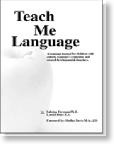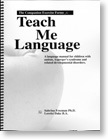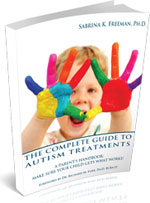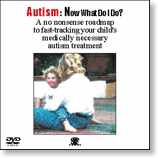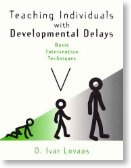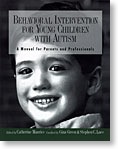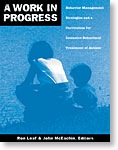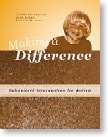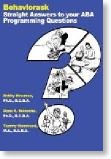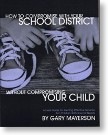Do Kids With Autism Eventually Learn to Speak?
19/03/13 15:25 Filed in: autism
An exciting headline that recently caught my eye claimed that a recent study published in Pediatrics found that most children with autism eventually do learn to speak. This claim piqued my curiosity because autism and language is a very big deal; therefore, I had to actually see what the authors in the study found.
Here’s my review of Predictors of Phrase and Fluent Speech in Children with Autism and Severe Language Delay, a study based on the Simon Simplex Collection (SSC), which is a large multisite data base project collecting a variety of information on families who are in some way affected by autism.
Wodka, Mathy and Kalb set out to ask two questions:
Using a very large sample of 372 children with Autism Spectrum Disorder (ASD), these researchers found that higher IQ and less social impairment were good predictors of eventual ability to speak in phrases. They report that 70% of the children in the database eventually learned to speak in phrases by eight years of age, and that 50% of the entire sample eventually became fluent speakers.
For the moment, let’s put aside the few methodological problems with the study (e.g., over-reliance on retrospective parental reporting by using a parent interview [ADI-R] and a parent checklist [Child Behavior Checklist]) and take what these researcher claim as accurate. Every parent is still waiting for the answer to the burning question:
Which treatment programs created such great outcomes? What makes kids with autism talk?
Regrettably, here’s where the study falls short. Although the researchers tip their hat to Behavioral Treatment when they mentioned a prior study by Pickett and colleagues that found participation in Behavioral Intervention programs and IQs over 50 were predictors of developing speech after 5 years of age, these researchers did not actually measure the effect of behavioral treatment programs on the acquisition of speaking in phrases. This omission is unfortunate because the reader is left with the impression that as long as the child has an average non-verbal IQ, and evidence of social interest, the child is likely to spontaneously speak in phrases without intervention. This is an erroneous conclusion because the study did not measure whether the children were in treatment or not. In other words, kids don’t magically attain speech when afflicted with the debilitating disorder of autism - there is usually a lot of heavy lifting involved, in the form of lengthy, intensive and expensive behavioral treatment.
Going forward, I would like to see the researchers control for treatment when studying our children. The study is only valuable if we know which treatments create the outcome of 50% of the entire sample eventually becoming fluent speakers!
One heartening finding in the Wotka et al. study is that there was no relationship found between “stereotyped behavior/repetitive interests” and language acquisition. The take-away message here is that we shouldn’t look at children who are hard to reach because self-stimulatory behavior is blocking the world out as somehow being less able to acquire language.
Children with autism most certainly can acquire language, as long as they have access to quality treatment for the disorder.
Here’s my review of Predictors of Phrase and Fluent Speech in Children with Autism and Severe Language Delay, a study based on the Simon Simplex Collection (SSC), which is a large multisite data base project collecting a variety of information on families who are in some way affected by autism.
Wodka, Mathy and Kalb set out to ask two questions:
- What is the rate of language acquisition of children with autism who, by age 4, had not put words together in phrases? and ...
- What factors did predict when these children would learn to speak in phrases?
Using a very large sample of 372 children with Autism Spectrum Disorder (ASD), these researchers found that higher IQ and less social impairment were good predictors of eventual ability to speak in phrases. They report that 70% of the children in the database eventually learned to speak in phrases by eight years of age, and that 50% of the entire sample eventually became fluent speakers.
For the moment, let’s put aside the few methodological problems with the study (e.g., over-reliance on retrospective parental reporting by using a parent interview [ADI-R] and a parent checklist [Child Behavior Checklist]) and take what these researcher claim as accurate. Every parent is still waiting for the answer to the burning question:
Which treatment programs created such great outcomes? What makes kids with autism talk?
Regrettably, here’s where the study falls short. Although the researchers tip their hat to Behavioral Treatment when they mentioned a prior study by Pickett and colleagues that found participation in Behavioral Intervention programs and IQs over 50 were predictors of developing speech after 5 years of age, these researchers did not actually measure the effect of behavioral treatment programs on the acquisition of speaking in phrases. This omission is unfortunate because the reader is left with the impression that as long as the child has an average non-verbal IQ, and evidence of social interest, the child is likely to spontaneously speak in phrases without intervention. This is an erroneous conclusion because the study did not measure whether the children were in treatment or not. In other words, kids don’t magically attain speech when afflicted with the debilitating disorder of autism - there is usually a lot of heavy lifting involved, in the form of lengthy, intensive and expensive behavioral treatment.
Going forward, I would like to see the researchers control for treatment when studying our children. The study is only valuable if we know which treatments create the outcome of 50% of the entire sample eventually becoming fluent speakers!
One heartening finding in the Wotka et al. study is that there was no relationship found between “stereotyped behavior/repetitive interests” and language acquisition. The take-away message here is that we shouldn’t look at children who are hard to reach because self-stimulatory behavior is blocking the world out as somehow being less able to acquire language.
Children with autism most certainly can acquire language, as long as they have access to quality treatment for the disorder.


